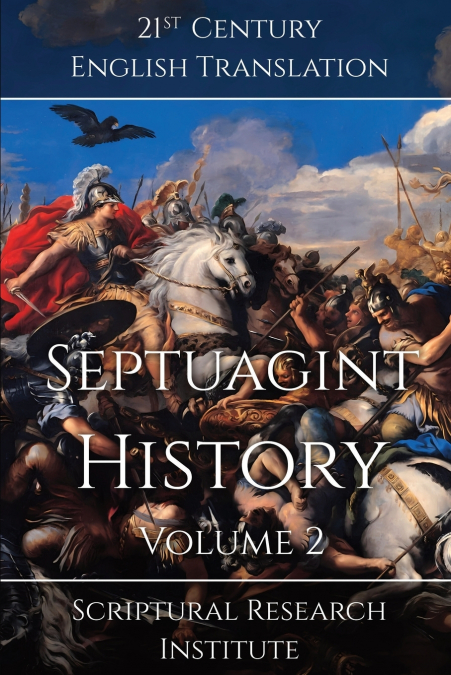
Scriptural Research Institute
In the mid 3rd century BC, King Ptolemy II Philadelphus of Egypt ordered a translation of the ancient Israelite scriptures for the Library of Alexandria. This translation later became known as the Septuagint, based on the description of the translation by seventy translators in the Letter of Aristeas. The History section of the Septuagint contained the books that told the history of the Israelite and Judahites from Joshua’s conquest of Canaan circa 1500 BC, until the establishment of the Hasmonean dynasty in Judea, in 140 BC.Septuagint: History, Volume 2, is composed of modern, non-theological translations of the books of Paralipomena, Ezra, Tobit, Judith, Esther, and Maccabees, which spanned roughly 950 BC to the creation of the Hasmonean kingdom of Judea in 140 BC. The books cover several eras of Judahite history, beginning with the fragmentary stories found in Paralipomena, books likely originating in Edom. The stories in Paralipomena cover the same eras as those found in the books of the Kingdoms, however, occasionally contradict the books of the Kingdoms, and are therefore viewed as an auxiliary version of Judahite history by biblical scholars.The two surviving versions of the books of Tobit are set during the Neo-Assyrian era, which also appears to have been the origin of the book of Judith. Both Judith and the Codex Vaticanus’ version of Tobit have been edited into anachronistic nonsense, however, the Sinaiticus version of Tobit still survives, which appears to be consistent with the history of the era, indicating the books likely did originate in the Neo-Assyrian and/or Median empires. Tobit specifically claims the first part of the book was written in Assyria, while the later sections had to have been written in Media, as the author reported moving there.The books of Ezra cover the era from the Persian conquest of Babylon, until 351 BC, less than 20 years before Alexander the Great conquered the Persian Empire. While the historical events in Jerusalem are not clearly understood during the Persian era, the sequence of events described in the books of Ezra do fit into the major events of Persian history well, however, have not generally been understood until the last two centuries, when archaeology in Iran produced a coherent view of Persian history. Historically, understanding the events in the books of Ezra, as well as Esther, which is set during the Persian Empire, was complicated by Rabbinical history, which redacted most of Persian history from the Judean records, as well as the fact that so many Persian kings held the same name. There were 5 kings named Artaxerxes, 3 named Darius, and 2 named Xerxes, and the dating of major events in the books of Ezra, used regal years without specifying which Artaxerxes, Xerxes, or Darius’s reign the year relates too.Three of the book of the Maccabees were added to the Septuagint in the 1st or late 2nd century BC, while a forth was added in the 1st century AD. Many other books of the Maccabees also exist, in Aramaic, Arabic, Ge’ez, and Yiddish. The books recount events that supposedly lead up to the Maccabean revolt in Judea, between 165 and 140 BC. Other than the first book, they have never been considered historically valid by rabbis or historians, and few Christian scholars have viewed them as a true record of events from the era. The fourth book labelled Maccabees in the Septuagint, is a philosophical reinterpretation of the events found throughout the Septuagint, from a 1st century Jewish perspective.